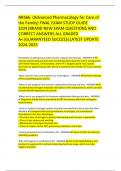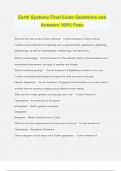NR566 (Advanced Pharmacology for Care of
the Family) FINAL EXAM STUDY GUIDE
2024|BRAND NEW EXAM QUESTIONS AND
CORRECT ANSWERS ALL GRADED
A+|GUARANTEED SUCCESS|LATEST UPDATE
2024-2025
Prevention of osteoporosis with hormone replacement therapy - ANSWER-✔HT
reduces postmenopausal bone loss and thereby decreases the risk for osteoporosis
and related fractures. Unfortunately, when HT is stopped, bone mass rapidly
decreases by approximately 12%. Hence to maintain bone health, HT must continue
lifelong.
Most common non-contraceptive use of estrogens. - ANSWER-✔Hormone therapy
(HT) in postmenopausal women
When to use progestin for hormone replacement therapy and why - ANSWER-✔to
counterbalance estrogen-mediated stimulation of the endometrium, which can lead
to endometrial hyperplasia and cancer.
When not to use progestin for hormone replacement therapy and why - ANSWER-
✔Progestins should not be prescribed as HRT for women who have undergone
hysterectomy.
Local vs. systemic estrogen options and why one would be chosen over the other -
ANSWER-✔Compared with oral formulations of estrogen, the transdermal
formulations have four advantages:
• The total dose of estrogen is greatly reduced (because the liver is bypassed).
• There is less nausea and vomiting.
• Blood levels of estrogen fluctuate less.
• There is a lower risk for DVT, pulmonary embolism, and stroke
Function/mechanism of combination OC - ANSWER-✔reduce fertility primarily by
inhibiting ovulation.
Role of Progestin in combination OC - ANSWER-✔acts in the hypothalamus and
pituitary to suppress the midcycle luteinizing hormone surge, which normally
triggers ovulation.
, Role of Estrogen in combination OC - ANSWER-✔suppresses release of follicle-
stimulating hormone from the pituitary (and thereby inhibits follicular maturation),
(2) main categories of OCs: - ANSWER-✔(1) those that contain an estrogen plus a
progestin, known as combination OCs, and (2) those that contain just a progestin,
known as "minipills" or progestin-only OCs
Absolute Contraindication w/ OC Therapy - ANSWER-✔Thrombophlebitis,
thromboembolic disorders, cerebral vascular disease, coronary occlusion, or a past
history of these conditions, or a condition that predisposes to these disorders
Abnormal liver function
Known or suspected breast cancer
Undiagnosed abnormal vaginal bleeding
Known or suspected pregnancy
Smokers older than 35 years
Progestin-only OCs, also known as "minipills" - ANSWER-✔do not cause
thromboembolic disorders, headaches, nausea, or most of the other adverse effects
associated with combination OCs. Unfortunately, although slightly safer than
combination OCs, less effective and are more likely to cause irregular bleeding
Most Effective Contraception - ANSWER-✔Etonogestrel subdermal implants
(Nexplanon)Intramuscular medroxyprogesterone acetate (Depo-
Provera)SterilizationIntrauterine device (IUD)
The method of contraception chosen most frequently by birth control users -
ANSWER-✔Sterilization: female sterilization (tubal ligation) plus male sterilization
(vasectomy) are selected by 19% of birth control users
Factors considered when a method of birth control is being chosen. - ANSWER-
✔effectiveness, safety, and personal preference
The most effective birth control methods - ANSWER-✔etonogestrel subdermal
implants (Nexplanon), intramuscular medroxyprogesterone acetate (Depo-Provera),
sterilization
IUDs.
Combination Oral Contraceptive Prototype - ANSWER-✔Ethinyl
estradiol/norethindrone
Progestin-Only Oral Contraceptive Prototype - ANSWER-✔Norethindrone
Long-Acting Contraceptives Prototype - ANSWER-✔Subdermal etonogestrel implant
(Nexplanon)
Depot medroxyprogesterone acetate (Depo-Provera)
,Drugs for Emergency Contraception - ANSWER-✔Levonorgestrel alone (Plan B One-
Step)
Ulipristal acetate (ella)
Progestin Drugs w/ greatest risk for thrombotic events - ANSWER-✔drospirenone
and desogestrel
OC and Cancer Risk - ANSWER-✔Present no known risk for cancer—with the
important exception of promoting (not causing) breast cancer growth.
Drugs whose effects are reduced by oral contraceptives. - ANSWER-✔Warfarin-
decrease effectiveness of drug by increasing effect of clotting factors
Insulin-decrease effectiveness of drug by increasing level of glucose
MUST INCREASE DOSE OF DRUGS TO BE EFFECTIVE
Drugs whose effects are increased by oral contraceptives. - ANSWER-✔theophylline,
tricyclic antidepressants, diazepam, and chlordiazepoxide
effectiveness of drugs are increased due to impaired hepatic metabolism from OC
Accelerate OC metabolism and thereby reduce OC effects. - ANSWER-✔Inducers of
hepatic cytochrome P3A4: CRAP GPS
Progesterone - ANSWER-✔acts before gestation to prepare the uterus for
implantation of a fertilized ovum. In addition, helps maintain the uterus throughout
pregnancy.
Non-Contraceptive Use of Progesterone - ANSWER-✔-counteract endometrial
hyperplasia caused by unopposed estrogen during hormone therapy;
-management of dysfunctional uterine bleeding, amenorrhea, and endometriosis;
-support of pregnancy in women with corpus luteum deficiency.
-used in in vitro fertilization cycles and to prevent prematurity in women at high risk
for preterm birth.
Testosterone Therapy Use - ANSWER-✔Replacement therapy (Male)
Hypogonadism (Male)
Methyltestosterone Therapy Use - ANSWER-✔Delayed puberty
Hypogonadism (Male)
Replacement therapy (Male)
Oxandrolone Therapy Use - ANSWER-✔Catabolic states (Cachexia)
Oxandrolone Black Box Warning - ANSWER-✔Agent can cause peliosis hepatitis, a
condition in which blood-filled cysts form in the liver, leading to liver failure or intra-
abdominal hemorrhage.
, Androgen Preparations for Male Hypogonadism - ANSWER-✔a nasal gel,
transdermal patch, transdermal gel, topical solution, buccal tablet, and implantable
subcutaneous pellets
Hepatotoxicity and Androgen Use - ANSWER-✔liver damage is associated primarily
with the 17-α-alkylated androgens; the 17-α-alkylated compounds should not be
used long term.
Topical/Gel Testosterone Education - ANSWER-✔(1) wash their hands after every
application, (2) cover the application site with clothing after the gel has dried, and (3)
wash the application site before anticipated contact with another person.
Warn women and children to avoid contact with the user's skin where testosterone
was applied and advise them to wash contaminated skin if accidental contact with an
application site should occur.
Androgen Therapy Education - ANSWER-✔Tell female patients about signs of
virilization (deepening of the voice, acne, changes in body and facial hair, menstrual
irregularities). Instruct them to report these if they occur.
Apprise patients of the signs of liver dysfunction (yellow tint to skin and eyes, fatigue,
loss of appetite, nausea, dark-colored urine, light-colored stools). Advise them to
report the occurrence of these changes.
Inform patients that swelling of the extremities or unusual weight gain may be
evidence of salt and water retention. Counsel them to report these events.
Remind patients of child-bearing age that this drug can cause fetal malformations. If
the patient is capable of becoming pregnant, emphasize the need for consistent use
of reliable contraception.
Androgen Contraindications - ANSWER-✔pregnant women, for men who have
prostate cancer or breast cancer, and for enhancing athletic performance.
Androgen Use and Anemia - ANSWER-✔Help relieve condition by promoting
synthesis of erythropoietin, the renal hormone that stimulates production of red
blood cells, and possibly white blood cells and platelets.
Androgen Monitoring Needs - ANSWER-✔Serum testosterone concentration, lipids,
liver function, and PSA after 1 year (refer to urologist for evaluation if PSA is greater
than 4.0 ng/mL or greater than 1.4 ng/mL above baseline)
Delayed Puberty Treatment - ANSWER-✔fluoxymesterone (Androxy, Halotestin)
and methyltestosterone (Methitest) are approved for this purpose; Off-Label
Androgen for limited use; Not to be used long term
Male Hypogonadism Treatment - ANSWER-✔Testosterone; Testosterone cypionate;
Testosterone enanthate; Fluoxymesterone; Methyltestosterone





